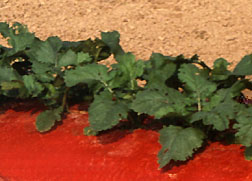Colored Mulch Starves Nematodes
|
|
Red plastic mulch is making life miserable for root knot nematodes in South Carolina tomato fields.
In springtime field tests at Florence, tomato plants grown with red plastic mulch were able to ward off the nematodes and produce more tomatoes than plants grown with black plastic mulch, say U.S. Department of Agriculture plant physiologist Michael J. Kasperbauer and Clemson University nematologist Bruce Fortnum.
For a decade, Kasperbauer and Patrick G. Hunt of USDA's Agricultural Research Service have been experimenting with colored mulches as a way to boost plant yields, while conserving water and controlling weeds. They found that red mulch boosts yields by increasing a tomato plant's ability to keep more of its growth above ground, especially in the fruit. But the latest study is the first documenting that red mulch also suppresses damage by nematodes that live in the roots.
"This is especially timely because of the impending ban on methyl bromide, which is used to treat the soil to kill nematodes," says Hunt. He and Kasperbauer are based at the agency's Coastal Plains Soil, Water, and Plant Research Laboratory in Florence.
The scientists are not certain how the red mulch helps tomato plants fight off nematodes. But Kasperbauer says it could be due to a tug-of-war between the mulch and the nematodes.
"The red mulch reflects wavelengths of light that cause the plant to keep more growth above ground, which results in greater yield," he says. "Meanwhile, the plant is putting less energy into its root system the very food the nematodes feed on. So reflection from the red mulch, in effect, tugs food away from the nematodes that are trying to draw nutrients from the roots," says Kasperbauer.
To test the effects of colored mulches in small-scale field plots, the research team sterilized the soil to eliminate all nematodes. Then they planted the tomatoes, mulched them with black or red plastic, and inoculated the roots with different numbers of nematodes ranging from 0 to 200,000 nematode eggs per plant.
The results were dramatic, especially in spring. Plants inoculated with 200,000 nematode eggs and grown with black plastic mulch produced only 8 pounds of tomatoes, compared to 17 pounds for the plants grown over red mulch.
Farmers and home gardeners who want to take advantage of the red mulch can buy it commercially. ARS has filed a patent on the mulch and is working cooperatively with Sonoco Products, Inc., of Hartsville, South Carolina, to develop improved plastic mulches.
Ken-Bar, Inc., of Reading, Massachusetts, sells the mulch directly and through several supply stores and catalogs. — By Sean Adams, ARS Information Staff.
ARS Coastal Plains Soil, Water, and Plant Research Laboratory, 2611 West Lucas St., Florence, SC 29501-1242; phone (843) 669-5203







